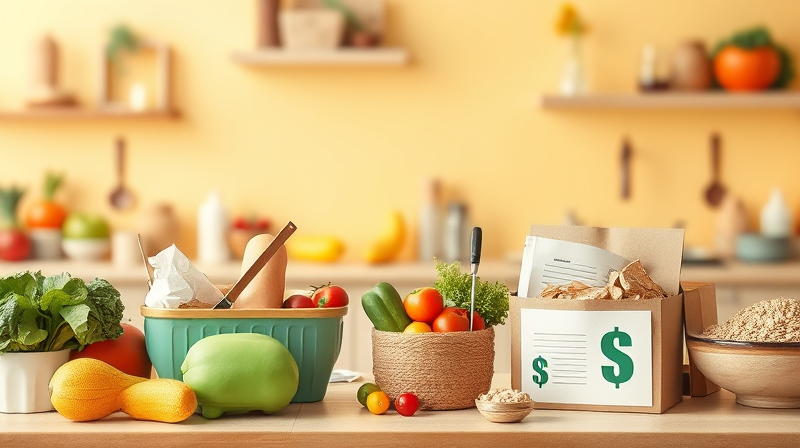In today’s rapidly changing world, being prepared is more important than ever. With rising inflation and occasional supply chain interruptions, having a well-structured plan for stocking your home can alleviate stress and ensure that you and your family are cared for. This article introduces you to practical strategies designed to help you build a dependable inventory of household essentials without overspending or wasting resources.
Planning ahead empowers you to navigate uncertainties with confidence. Knowing which items to keep at hand can prevent urgent shopping trips in emergencies, ultimately saving money and reducing anxiety around unexpected price changes.
Key Strategies for a Smart Household Inventory
To create an efficient stockpile, it is essential to start with a strategic plan that focuses on your household’s unique needs. Assessing the amount of space available, considering family size, and examining special dietary or medical requirements are critical initial steps. Once these are in place, you can build your stock so that it is not only reliable but also flexible for everyday use and emergencies.
Begin with a careful plan. Identify which items you use consistently. It is wise to separate items needed for short-term consumption (over the next few weeks) from those that last longer, ensuring that nothing goes to waste.
- Prioritize versatile, long-lasting items. Stock up on food staples such as rice, pasta, beans, and canned goods, which serve as the foundation of nutritious meals. These dry goods don’t spoil quickly and can be used in countless recipes.
- Keep essential cleaning supplies on hand. With unpredictable supply variations, having reliable cleaning products like multi-surface cleaners and disinfectants fosters a healthy home environment.
- Don’t forget your personal care items. Everyday products like soap, toothpaste, and shaving supplies are always in demand and typically have a longer shelf life.
- Prepare for emergencies with basics like batteries and medicines. These items maintain their relevance in times of need when access to healthcare or energy might be limited.
Buying in bulk is another cornerstone of effective stockpiling. Major retailers often provide discounts for larger quantities, reducing the unit cost and saving money over time. Loyalty programs and digital coupons are additional tools that empower you to maximize your savings while minimizing waste.
Utilize the power of bulk buying by checking out retailers that specialize in large purchases. By combining your buying efforts with nearby community members or trusted friends, you create a network that collectively eases expenses and reduces the risk of supply shortages.
Another smart strategy is adopting thoughtful shopping habits. Instead of making sporadic, unplanned purchases, consider integrating extra items into your regular trips to avoid unnecessary stress on your budget. This slow-and-steady approach not only helps manage finances but also reduces the temptation to waste food and supplies.
Efficient storage also plays a pivotal role in ensuring your stockpile remains useful. By adopting creative storage solutions, like vertical shelving and airtight containers, you can keep food fresh and guard against pests. A periodic review of your inventory is crucial: remove expired items and donate those that can no longer be used. This regular maintenance keeps your stockpile efficient and relevant.
Incorporate your stock into everyday life by rotating items into your regular meals and household routines. When products are used consistently, they continue to serve their purpose, and you learn to better manage expiration dates and overall consumption.
Solid preparation also involves being ready for unforeseen emergencies. Stocking basic medical supplies, bottled water, and electrolyte solutions can prove lifesaving during natural disasters or public crises. The convenience of having a prearranged set of necessities supports a resilient mindset, bolstering your ability to respond calmly when faced with challenges.
For those with access to outdoor spaces, consider growing your own produce. Creating a small garden or even indoor herb pots can drastically supplement your inventory. Learning preservation techniques like canning or dehydrating your harvest further extends the life of homemade goods, ensuring that nothing goes to waste.
Building a community network is another inspiring way to sustain an efficient household inventory. Collaborate with neighbors, join local co-ops, or even exchange supplies with friends. This collaborative spirit not only cuts costs but also strengthens bonds, fostering a sense of unity and mutual support in uncertain times.
Finally, staying informed and adaptable is key to success. Monitor market trends, seasonal sales, and price fluctuations, so you can make timely decisions about restocking and taking advantage of discounts. Adapting to changing circumstances means that your preparedness strategy remains flexible and robust, no matter what the future holds.
By embracing these practical strategies, you cultivate confidence and resilience in your day-to-day life. The process of smart stocking is not about hoarding or over-preparation; it is about thoughtful, intentional planning that meets your household’s needs and builds a sustainable lifestyle. Remember, every small decision today paves the way for a secure tomorrow.
Empower yourself with these actionable steps, and transform your approach to managing household essentials. With careful planning, informed decision-making, and a collaborative spirit, you can meet any challenge with grace and preparedness.








